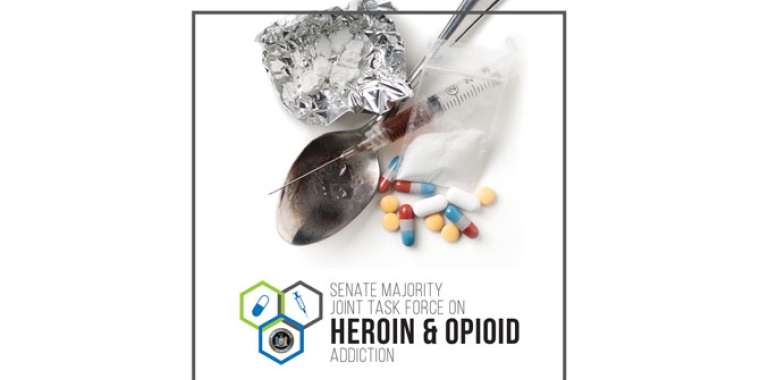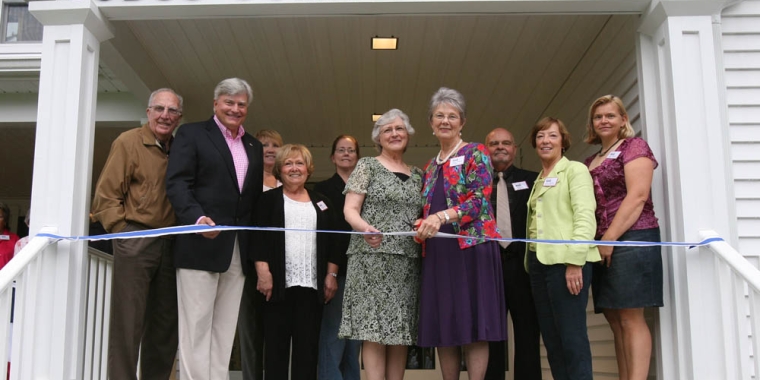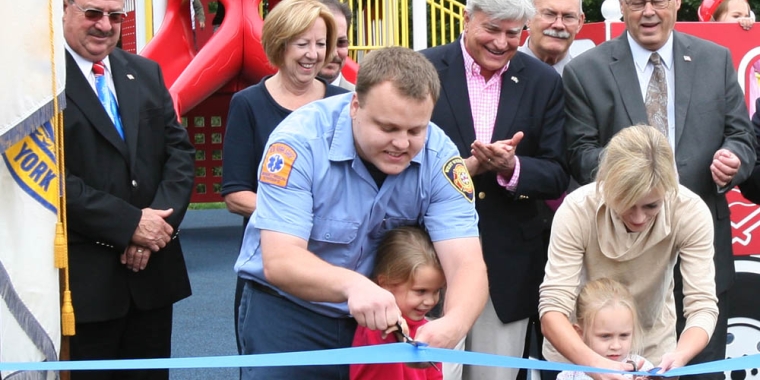
Senator Nozzolio Announces Passage of Bills Tackling the Heroin and Opioid Crisis
Michael F. Nozzolio
May 19, 2016
-
ISSUE:
- Heroin and Opioid Addiction

Senator Michael F. Nozzolio announced the State Senate has enacted a package of 22 bills, which take a comprehensive approach to fighting the ongoing heroin and opioid addiction crisis in New York. The measures are among the recommendations from a report released by the Senate’s Joint Task Force on Heroin and Opioid Addiction of which Senator Nozzolio is a current member and former Vice Co-Chair. The recommendations reflect the need for improving prevention efforts, increasing access to treatment, expanding recovery options and, providing greater resources to law enforcement to aid in combating this crisis.
The Task Force created a four-pronged approach – focusing on prevention, treatment, recovery, and enforcement – that was used in developing the legislative and budgetary recommendations after extensive collaboration with stakeholders at forums in communities across the state.
“America is in the midst of a crippling heroin epidemic,” said Senator Nozzolio. “In every state across our nation, communities just like those in the Finger Lakes region, are facing a serious battle against the worse addiction crisis in our nation’s history. With overdose deaths tripling in New York State over the past twelve years the heroin epidemic is destroying countless lives right here in our local communities. Heroin and opiate addiction, once a problem limited to large cities, is now hitting small communities hard and they are struggling with its effects. The causes of this epidemic are wide ranging and I believe there are no easy answers or quick solutions to this mounting problem,” continued Senator Nozzolio.
The bills passed comprise the majority of the legislative action needed to address many of the issues raised by the state’s opioid crisis, with the remaining legislation expected to be voted upon before the end of this year’s session. The measures include:
Prevention:
- S6091B – Limits initial prescriptions of controlled substances. This bill ameliorates the excess volume of pills on the street, while also providing better continuity of care.
- S4348A – Creates a Prescription Pain Medication Awareness Program. The Department of Health (DOH) and the State Education Department (SED) would establish standards for three hours of instruction to be completed prior to renewal of registration on topics including I-STOP requirements, pain management, appropriate prescribing, acute pain management, palliative medicine, addiction screening and treatment, and end-of-life care. Additionally, it establishes exemptions for practitioners who would not require such training due to the nature, area, or specialty of his or her practice.
- S6962A – Enhances patient access to abuse-deterrent technology for opioids.
- S7315 – Ensures proper opioid education to prescribed patients. Additionally, the bill requires the same information be provided to patients administered opioids while in the hospital, and requires acknowledgment of receipt of the information in the patient’s discharge plan.
- S6516A – Establishes a Narcan kit registry. This bill directs the DOH to expand its reporting of opioid overdose data by tracking the number of opioid overdoses generally, in addition to the number of opioid overdose deaths. The Department is also required to examine data related to areas of the State experiencing high rates of opioid overdoses and if any areas of the State have reduced overdose rates after receiving State resources or services.
- S5546A – Provides instruction of mental health, alcohol, drug, and tobacco use in junior and senior high schools.
- S7365 – Requires patient counseling prior to issuing a prescription for a schedule II opioid.
Treatment:
- S7301 – Continues education for credentialed alcoholism and substance abuse counselors.
- S7317A – Removes barriers to Medication Assisted Treatment (MAT).
- S6248B – Enhances emergency intervention procedures. This bill extends the amount of time a person can be involuntarily held for a substance abuse disorder for emergency care from 48 hours to 72 hours and establishes criteria in which a person may be involuntary sent to treatment for a substance abuse disorder.
- S631 – Enables a court to order assisted outpatient treatment (AOT) for an individual with a substance use disorder who, due to his or her addiction, poses a threat to him or herself or others.
Recovery:
- S7446 – Authorizes OASAS to provide funding to substance use disorder and gambling programs operated by for-profit agencies.
- S3989A – Creates a Sober Living Task Force charged with establishing best practice guidelines for sober living residences that illustrate the most appropriate and effective environment for persons recovering from a chemical dependency.
- S6874 – Establishes that participation in a judicial diversion program cannot be conditioned on the specific type or brand of drug prescribed to a defendant during the course of medically prescribed drug treatments under the care of a health care professional.
Enforcement:
- S100 – Allows someone to be charged with the crime of intent to sell if they possessed 50 or more packages of a Schedule I opium derivative, or possessed $300 or more worth of such drugs.
- S4177 – This bill changes the number of persons needing to be involved and charged as part of a drug organization from four to three. Also, to reflect the low street prices of heroin, the bill lowers the minimum required proceeds from the sale of controlled substances during a 12 month period from $75,000 to $25,000.
- S7200 – Creates Drug-Free Zones around drug or alcohol treatment centers and methadone clinics.
- S7012 – Creates appropriate levels of weight as it relates to the sale of heroin. Heroin weighs less than other drugs and therefore more doses of heroin are needed to trigger various criminal offenses.
- S6317 – Enhances judicial access to juvenile records for determining judicial diversion program eligibility. Current law does not give judges access to all criminal records - records that could exclude potentially violent or dangerous individuals from judicial diversion programs and prevent casualties.
- S6632A – Adds fentanyl to the controlled substance schedule. This bill brings New York’s schedule in line with the current Federal Schedule and increases criminal penalties for the sale of an opiate controlled substance containing a fentanyl derivative.
- S7397 – Establishes Xylazine as a controlled substance. Xylazine is a veterinary sedative, which has been found mixed into heroin by drug dealers to increase the effects of the drug.
- S4163 – Creates the crime of homicide by sale of an opioid controlled substance. This bill holds drug dealers accountable for lives lost as a result of their activities by creating an A-I felony for the unlawful transportation or sale of an opioid controlled substance that causes the death of another person.
“The adoption of these measures is a significant step toward properly combating the heroin epidemic that is plaguing our region. I will continue my efforts to raise awareness about this rising epidemic and I am hopeful that law enforcement officials, teachers, parents and community members will continue to do the same and share their ideas, suggestions and concerns with me,” concluded Senator Nozzolio.
The bills await action by the New York State Assembly.
Share this Article or Press Release
Newsroom
Go to NewsroomSenator Nozzolio welcomes Kelly Battaglini to his College Internship program
September 26, 2013


Senator Nozzolio helps dedicate the new First Responders Memorial playground
September 25, 2013

Senator Nozzolio Honors POW/MIA Recognition Day
September 20, 2013
